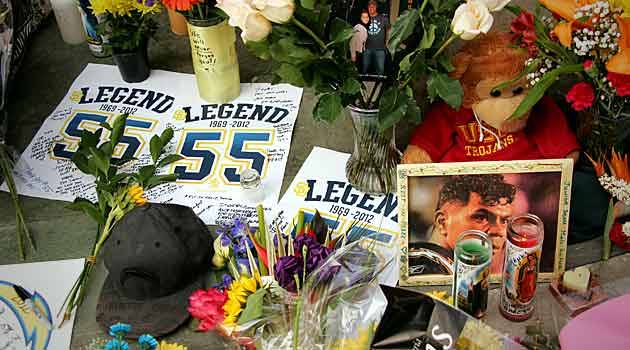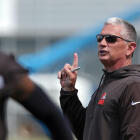Can Junior Seau's death make NFL players think about their future?
Maybe more than any other player who has died within the past few years, the death of Junior Seau could be the tipping point for current players to finally care about the effects of brain trauma and what it could mean for them in their post-football lives.
•
4 min read
 |
| Perhaps the death of Junior Seau can help inspire change. (Getty Images) |
Maybe more than any other player who has died within the past few years, the death of Junior Seau could be the tipping point for current players to finally (finally!) give a damn about the effects of brain trauma and what it could mean for them in their post-football lives.
In many conversations with current players, I’ve never gotten the idea they were interested in changing the game or making it safer in order to avoid the kinds of collisions that help lead to a reduced quality of life once they leave the NFL.
During a Super Bowl week press conference, center Jeff Saturday and I went around and around on this issue. Like I told Saturday, I believe the vast majority of players don’t think about the future, and he disagreed. Although Troy Aikman and Kurt Warner have begun to rethink the idea of whether they’d want their sons (or, in Aikman’s case, his hypothetical sons) to play football, I’ve talked to quite a few NFLers who won’t think twice about letting their sons enter this violent sport.
| Junior Seau, dead at 43 |
NFL players do have that context. But the money is good and the game is too exciting and it’s been a part of their lives for too long. It’s too hard to walk away or to think about drastically altering the game to make it safer.
But when Seau took a gun, pointed it at his chest and pulled the trigger, perhaps that moment will force current players to realize the imminent danger in which they put themselves for cash and for our entertainment.
We obviously don’t know why Seau killed himself, but he did so in the same matter of former Bears standout Dave Duerson -- who left a note saying he wanted to donate his brain for research. And that research found that Duerson's brain was damaged significantly.
“I'm still in disbelief," Redskins linebacker London Fletcher told SI’s Peter King for this week’s Monday Morning Quarterback. "Still having a hard time with it. I've thought about him every day. And I think about what I'm going to be like at his age, 43, and how I'll be coping with life after football. I keep going over and over it. What am I going to be like several years down the road? I'm definitely concerned with quality of life after football. This makes me a little more scared about it."
Fletcher has played in the league for 15 years, and like Seau for much of his career, Fletcher has been remarkably resilient, not missing a game due to injury since 1998. But Seau’s death has forced him to confront his future. And to think about the ways he eventually might need to ask for help.
In fact, he told King he wants the NFL and the NFLPA to agree to force players to attend counseling sessions when they leave the NFL for good. Fletcher knows if it’s voluntary, many players won’t bother. That’s why, he says, it needs to be mandatory.
In that sense, maybe we can find a tiny positive in Seau’s senseless tragedy. After all, unlike Duerson and other former players who have committed suicide, Seau only recently retired. He was still connected with the game in a big way, and moreso than any other recent player who died, the shockwaves felt across the NFL were especially bumpy.
“I had a cousin call me right away and say, 'I'm here if you ever want to talk,’” Fletcher said. “The good thing about this, I think, is that many players around the league are having family members reach out to them, asking how they're doing.”
It’s too late for Seau (and for Duerson and Mike Webster and Ray Easterling and Andre Waters). But it doesn’t have to be too late for the current players. Their thought process still needs to change. They still need to keep pondering the future while they play in the present.
But hopefully Seau’s death can begin shifting the paradigm. Even if it's just a little at a time.
For more NFL news, rumors and analysis, follow @EyeOnNFL on Twitter, and subscribe to our Pick-6 Podcast and NFL newsletter. You can follow Josh Katzowitz on Twitter here: @joshkatzowitz.

















